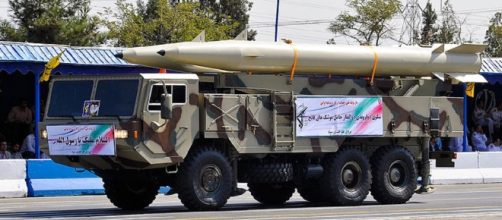The Washington Free Beacon, citing a Syrian opposition news site, is reporting that Iran has established a factory in Syria for the production of long-range missiles. Iran is being assisted in this task by Russian and North Korean experts. The news has some disturbing implications for peace and security in the region.
What kind of facility has Iran built?
The facility is being operated under the Syrian Scientific Studies and Research Center, which also features Syria’s chemical weapons program. The factory is building long-range missiles as well as a version of the Syrian M600 ballistic missile with a 200 to a 300-kilometer range.
Similar missiles have been used by Hezbollah to attack Israel.
Implications for Middle East security
Hitherto, Iran has had to transport its version of the M600, the Fateh-110, into Syria and Lebanon for delivery to its terrorist clients such as Hezbollah. Such shipments have been subject to attack by the Israeli Air Force. Now, the Iranians will be able to build missiles practically on site, cutting down the time and distance it needs to deliver them to the terrorists.
The reference to long-range missiles is ever more disturbing. Depending on how far these missiles could be fired, a missile base in Syria could be used to attack a number of targets in the Middle East, including Sunni Arab countries such as Saudi Arabia, with which Iran is in conflict.
Such a capability is highly destabilizing, especially if such missiles are mated with chemical warheads. Such a capability in the center of the Middle East would constitute a clear and present danger to a number of countries as well as American interests.
What can be done?
Clearly, the Iranian missile factory would be a prime target for a massive air strike to take it out and thus stop the proliferation of potential weapons of mass destruction in the center of the Middle East. Either Israel or the United States should be able to accomplish the operation in short order.
However, the presence of Russia personnel at the facility provides a complicating factor. Even if one does not share President Donald Trump’s dream of enlisting Russia in the war on terror, the idea of killing Russians in a military action is something that needs to be thought about very carefully.
Vladimir Putin is likely to react very badly to having his people killed, even if they are aiding in an undertaking that threatens the peace and security of the region. The United States and Israel have to weigh the pros and cons of taking out the threat while engaging an enemy with the capability to perform a great deal of mischief.


